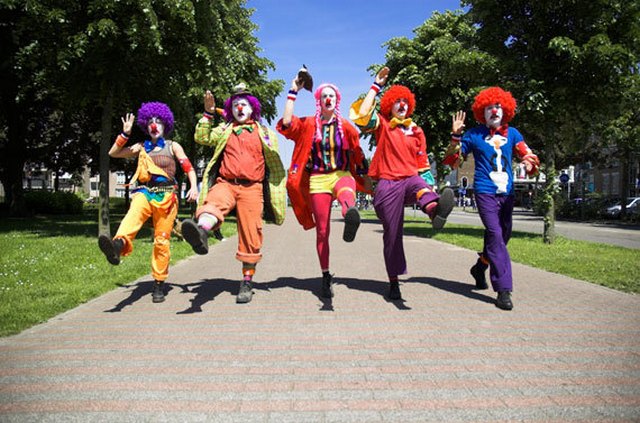News
In May 2014 Rebelact will organise a serie of info nights about the present situation in Egypt. Maro, a female Egyptian activist and rebel clown, will give lectures on the recent developments... More
Get Involved
Rebel clowning and creative activism in the media
Disarm the police. Clowning around is serious politics
On Sunday 16 December [2007], a man who calls himself Colonel H. Salavila, wearing a pink Afro wig and a rainbow bowtie, led a group of clowns in white face paint and big red noses into Schiphol airport. They held a subversive circus in the arrivals hall, whistling, whooping and mopping in tune to a gypsy samba band, while dusting everything in sight.
The event, oddly enough, was meant to support the airport's cleaning men and women, part of a group called Cleaners for a Better Future, who are demanding a minimum wage of € 10 an hour, stronger worker protections and the right to organise without fear of retribution... More
Why we need cultural activism
In July 2005 it seemed almost normal for me to be with 200 other people all dressed in crazy camouflage adorned with pink and green fluff, clown white on our faces and colanders on our heads. On our way to meet the Make Poverty History marchers in Edinburgh during the 2005 G8 summit to invite them to join us in taking direct action, we were trying hard to march in step with our feather dusters strung over our shoulders. OK, the Clandestine Insurgent Rebel Clown Army is an absurd army but it is also a serious response to the criminalisation of protesters and dissent. So I was not prepared for the angry comments of a very serious acquaintance of mine, dressed in black: ‘This isn’t funny. We are at war and we need to be able to fight. ... You are encouraging people to think that this is a joke, and the state is very, very serious... More
Reflections on the G8 Protests: An Interview with General Unrest of the Clandestine Insurgent Rebel Clown Army (CIRCA)
The following is the text of an interview that I conducted with General Unrest, a member of the Clandestine Insurgent Rebel Clown Army (CIRCA) - one of the groups involved in the protests against the G8 in Gleneagles, Scotland. The issues raised here - concerning the politics of affinity and affect, the perfomativity and strategy of direct action, and the critique of militarism - are of clear relevance to a critical geography interested in how challenges to neoliberalism and the war on terror are articulated. I met General Unrest in a tea-shop in Glasgow's West End, overlooking the Kelvin river. I began by asking the General to explain what the Clandestine Insurgent Rebel Clown Army was... More
The Clandestine Insurgent Rebel Clown Army goes to Scotland via a few other places
The early morning radio reports traffic disruption across central Scotland. 'Avoid the area if you can', says the presenter as she lists dozens of roads and railway lines that have been blocked by protesters during the opening of the G8 summit. Fresh from a little jaunt on the A9 motorway involving 60 rebel clowns in military uniforms, over 100 policemen in riot gear, several barking police dogs, a few delegates coaches and dozens of bright orange traffic cones, a small gaggle of clowns is making its way to the G8 Alternatives march... More
How to prank, play and subvert the system
One placard that got plenty of media coverage at the biggest 2003 anti-war march in London, was 'Make Tea Not War', a placard, it turned out, that was made by an advertising agency. The question is: whose propaganda wins?
The black clad unwashed or the Diesel model dressed up to look like they give a shit? Whose side of the story is being told? What effect do charity celebrities such as Bob Geldof and Bono have on radical agendas, and on the way our stories, desires, rage and alternatives are presented?
This movement can and does create powerful images and stories that are vital tools for radical change. When we think about creativity we don't mean paint and canvas, bright costumes or painting your face. And by images we don't just mean photographs. What we feel is important is what our stories do and how they are framed... More

The National Duckies Front exercises the 'Prussian March' on their way to a demonstration of neo-Nazis in Den Bosch, the Netherlands on Saturday, May 23rd 2009. Photo: Alexandra Reuter